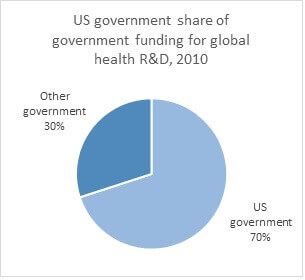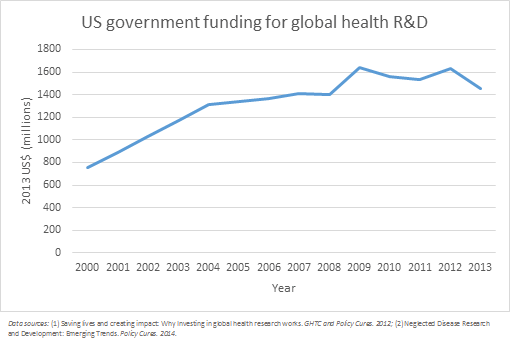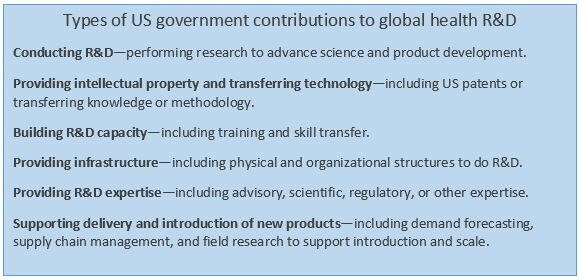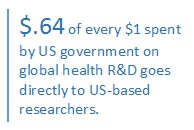This Independence Day, GHTC is taking a break from our cookouts and parades to celebrate America’s extraordinary contributions to advancing innovation
to save lives around the world.
The US government has long played a leading role in the development of new technologies to diagnose, treat, and prevent diseases and conditions impacting
people living in the world’s poorest places. US leadership in global health research and development (R&D) is a testament to our nation’s character,
our ingenuity and entrepreneurial spirit, and our dedication to improving human lives worldwide.
Below GHTC takes a look at America’s contributions to global health innovation:
The US government is the largest funder of global health R&D in the world.
 The US government is by far the largest funder of global health R&D—contributing around 45 percent of total investment and 70 percent of all government investment each year.
Even when measured as a proportion of gross domestic product (GDP), the US government remains the largest funder of global health R&D.
The US government is by far the largest funder of global health R&D—contributing around 45 percent of total investment and 70 percent of all government investment each year.
Even when measured as a proportion of gross domestic product (GDP), the US government remains the largest funder of global health R&D.
Between 2000-2013, the US government invested over US$18 billion in global health R&D.
While this may sound like an extraordinary amount of money, annual US investment in global health R&D represents only a tiny fraction of overall US
government spending—less than one-tenth of one percent of our GDP.
While US investment in global health R&D nearly doubled between 2000 and 2009, funding has been largely stagnant, or on the decline, since then. A
sustained and robust US investment in R&D by the United States is critical to delivering the next generation of health technologies to address
both existing and emerging diseases and conditions.

The US government contributes more than just funding to advance global health R&D.
Five federal agencies that are engaged in global health R&D—the US Agency for International Development, National Institutes of Health, Centers
for Disease Control and Prevention, Department of Defense, and the Food and Drug Administration—contribute much more than just funding.

The US government has been involved in the development of many breakthrough technologies that are transforming global health.
Between 2000 and 2010, the US government was involved in the development of over half (25) of the 45 global health products.
The US government has been involved in the development of lifesaving innovations, including:
- Antiretroviral treatments, which have dramatically extended the lives of those living with HIV and AIDS.
- A vaccine that protects against meningitis A, costing less than $.50 per dose, which been delivered to more than 251 million people in Africa’s meningitis belt since its launch in 2010.
- A pediatric antimalarial drug, which has had 300 million treatments delivered to children suffering from malaria in 50 endemic countries since 2009.
US investment is fueling a robust pipeline of global health products with the promise to save and improve lives.
As of 2012, the US government was involved in the development of 200 of the 365 global health products in the development pipeline.

Promising innovations under development receiving support from
the US government include:
- A preventative HIV and AIDS vaccine that could dramatically reduce new infections.
- New tools to prevent and treat malaria, including medicines that will both protect against the disease and prevent its transmission.
- Vaccines to prevent tuberculosis (TB), which are in various phases of clinical trials.
- New cost-effective diagnostics for malaria, TB, and neglected tropical diseases (NTDs).
- New vaccines for NTDs—such as dengue fever, Chagas disease, and leishmaniasis.
US contributions to global health R&D are having a ripple effect beyond saving and improving lives.
 US contributions to global health innovation not only saves lives, but also produce direct benefits for Americans by creating jobs, strengthening US
competitiveness in research and technology, improving US relations abroad, and enhancing our health and national security.
US contributions to global health innovation not only saves lives, but also produce direct benefits for Americans by creating jobs, strengthening US
competitiveness in research and technology, improving US relations abroad, and enhancing our health and national security.
US investments also drive economic progress and reduce poverty in low- and middle-income countries (LMICs). Between 2000 and 2011, health improvements accounted for about 11 percent of economic growth in LMICs.
The development of new health technologies will ultimately provide LMICs with the solutions they need to tackle their most pressing health challenges
and chart a course for self-sustainment.
So this Fourth of July, as you enjoy your burger and watch fireworks light up the sky, take a moment to celebrate America’s contributions to global health.
While there is much more to be done, Americans should take pride in our nation’s efforts to advance innovation to save lives worldwide.

 The US government is by far the largest funder of global health R&D—contributing
The US government is by far the largest funder of global health R&D—contributing 


 US contributions to global health innovation not only saves lives, but also produce direct benefits for Americans by creating jobs, strengthening US
competitiveness in research and technology, improving US relations abroad, and enhancing our health and national security.
US contributions to global health innovation not only saves lives, but also produce direct benefits for Americans by creating jobs, strengthening US
competitiveness in research and technology, improving US relations abroad, and enhancing our health and national security.